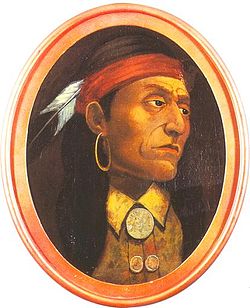
Back بونتياك (زعيم قبيلة) Arabic Pontiak (hindu) Azerbaijani Пантыяк (правадыр) Byelorussian Понтиак (вожд) Bulgarian Pontiac Catalan Pontiac (náčelník) Czech Pontiac (Häuptling) German Jefe Pontiac Spanish رئیس پونتیاک Persian Pontiac (intiaanipäällikkö) Finnish
Pontiac | |
|---|---|
 No authentic visual depictions of Pontiac are known to exist.[1] This interpretation was painted by John Mix Stanley. | |
| Born | c. 1714/20 |
| Died | April 20, 1769 (aged 48–55) near Cahokia, Illinois Country |
| Cause of death | Assassination |
| Nationality | Odawa |
| Occupation(s) | Regional speaker; Indian war chief |
| Known for | Pontiac's War |
Pontiac or Obwaandi'eyaag (c. 1714/20 – April 20, 1769) was an Odawa war chief known for his role in the war named for him, from 1763 to 1766 leading Native Americans in an armed struggle against the British in the Great Lakes region due to, among other reasons, dissatisfaction with British policies. It followed the British victory in the French and Indian War, the American front of the Seven Years' War. Pontiac's importance in the war that bears his name has been debated. Historical accounts from the 19th century portrayed him as the mastermind and leader of the revolt, but some subsequent scholars argued that his role had been exaggerated. Historians today generally view him as an important local leader who influenced a wider movement that he did not command.
The war began in May 1763 when Pontiac and 300 followers attempted to take Fort Detroit by surprise. His plan foiled, Pontiac laid siege to the fort, where he was eventually joined by more than 900 warriors from a half-dozen tribes. Meanwhile, messengers spread the word of Pontiac's actions, and the war expanded far beyond Detroit. In July 1763, Pontiac defeated a British detachment at the Battle of Bloody Run, but he was unable to capture the fort. In October, he lifted the siege and withdrew to the Illinois Country. Pontiac's actions contributed to the British Crown's issuance of the Proclamation of 1763, which prohibited any settlers west of the Appalachian Mountains to preserve an area for Native Americans.
Pontiac's influence declined around Detroit because of the siege but he gained stature as he continued to encourage the various tribal leaders to fight against the British. Seeking to end the war, British officials made him the focus of their diplomatic efforts. In July 1766, he made peace with British Superintendent of Indian Affairs Sir William Johnson. The British attention to Pontiac aroused resentment among other tribal leaders, as the war effort was decentralized. Pontiac claimed greater authority than he possessed. He was increasingly ostracized and in 1769 he was assassinated by a Peoria warrior.
© MMXXIII Rich X Search. We shall prevail. All rights reserved. Rich X Search